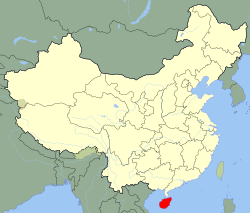List of the CCP Hainan committee secretaries
| Image | Name (English) | Name (Chinese) | Tenure begins | Tenure ends | Note |
|---|---|---|---|---|---|
| Xu Shijie | 许士杰 | April 1988 | June 1990 | [1] [2] [3] | |
| Deng Hongxun | 邓鸿勋 | June 1990 | January 1993 | [4] [3] | |
| Ruan Chongwu | 阮崇武 | January 1993 | February 1998 | [5] [3] | |
 | Du Qinglin | 杜青林 | February 1998 | August 2001 | [3] |
| Bai Keming | 白克明 | August 2001 | November 2002 | [6] [3] | |
 | Wang Qishan | 王岐山 | November 2002 | April 2003 | [7] [3] |
| Wang Xiaofeng | 汪啸风 | April 2003 | December 2006 | [8] [3] | |
| Wei Liucheng | 卫留成 | December 2006 | August 2011 | [9] [3] | |
| Luo Baoming | 罗保铭 | August 2011 | April 2017 | [10] [3] | |
 | Liu Cigui | 刘赐贵 | March 2017 | November 2020 | [11] |
 | Shen Xiaoming | 沈晓明 | November 2020 | March 2023 | [12] |
 | Feng Fei | 冯飞 | March 2023 | Incumbent | [13] |

